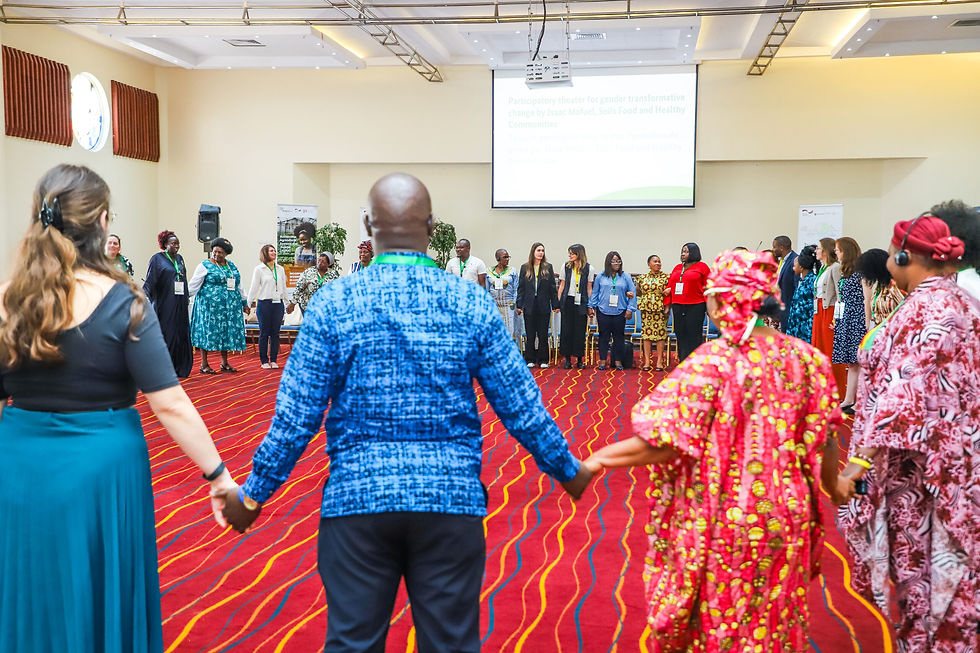Together: Strengthening Women’s Voices for Sustainable Agriculture and Food Systems
- Laura Gotti
- Feb 27, 2025
- 3 min read
Updated: Feb 28, 2025
Nairobi, 18th – 20th February 2025

Addressing Gender Inequality in Agriculture: The Need for Men's Engagement
Agriculture is the backbone of many economies worldwide, particularly in developing countries, where it provides employment and sustenance for millions. However, gender inequality remains a significant barrier to progress in this sector. Women make up almost half of the agricultural workforce globally, yet they have less access than men to essential resources such as land, credit, education, and technology. This inequality is particularly evident in Rwanda, where women contribute significantly to farming but continue to face systemic barriers that limit their productivity and decision-making power.
The recent Together: Strengthening Women’s Voices for Sustainable Agriculture and Food Systems conference in Nairobi brought global experts together to discuss strategies for creating a more inclusive and sustainable agricultural system. RWAMREC’s Director of Programs, Gisèle Umutoniwase, participated in this vital dialogue, highlighting the critical role of gender-transformative approaches in agriculture. One of the key takeaways from the conference was the need for men to transition from being gatekeepers of gender norms to active participants in fostering gender equality, particularly in the agricultural space.

Men's Role in Advancing Gender Equality in Agriculture
The agricultural sector has long been dominated by gendered power dynamics that favor men in land ownership, financial access, and decision-making. RWAMREC has consistently advocated for engaging men as allies in gender equality rather than reinforcing traditional roles that disadvantage women. When men become active supporters of women’s economic empowerment, communities experience greater food security, higher incomes, and improved well-being for all.
One critical issue in agriculture is the burden of unpaid care work, which disproportionately falls on women. In addition to farming responsibilities, women are often expected to manage household chores, childcare, and elder care, significantly reducing their ability to participate fully in income-generating agricultural activities. Addressing these imbalances requires shifting social norms and implementing policies that support equitable labor distribution at home and in the fields.
RWAMREC’s Engagement with GIZ in Burkina Faso
During the conference, Gisèle Umutoniwase shared insights from RWAMREC's successful collaboration with GIZ in Burkina Faso, where the organization worked to integrate gender perspectives into agricultural training programs. The project focused on transforming traditional gender roles by training male and female farmers on the economic benefits of gender equality. One of the key strategies was incorporating gender-responsive methods into existing agricultural and financial training, ensuring that women had access to the same opportunities as men. The initiative also emphasized the importance of raising awareness among men about the value of shared decision-making and equitable labor division. As a result, many participating households reported increased agricultural productivity and improved family well-being. The project demonstrated that gender equality is not just a women’s issue but a societal transformation that benefits all.

Gender Equality and Climate Change Mitigation
Another significant discussion point at the conference was the intersection of gender equality and climate change mitigation. Studies, including research from Project Drawdown, highlight that women’s lack of access to education and resources is a major contributing factor to environmental degradation. When women are empowered through education, they tend to make more sustainable agricultural choices, leading to better conservation practices and climate resilience.
Also read: Project Drawdown's research highlights that educating girls is a powerful climate change mitigation strategy, potentially reducing CO₂ emissions by 51.48 gigatons by 2050.
Gender-transformative approaches in agriculture can help address both gender inequality and climate change. By ensuring women have equal access to land, financial resources, and education, communities can adopt more sustainable farming practices, reduce emissions, and improve overall environmental sustainability. Investing in women farmers is, therefore, a crucial strategy for building climate-resilient food systems.
Moving Forward: A Call to Action
RWAMREC remains committed to promoting gender-transformative approaches in the agricultural sector, ensuring that men and women can thrive together in sustainable food systems. The Together Conference in Nairobi reinforced that gender equality must be integrated into all aspects of agricultural policy and practice to create meaningful and lasting change.
As we move forward, we call upon policymakers, development partners, and agricultural stakeholders to:
Increase investment in gender-responsive agricultural policies
Support programs that engage men as allies in gender equality
Reduce women’s unpaid care burden through equitable policies and community initiatives
Promote women’s access to land, credit, and education
Integrate gender perspectives into climate action strategies
By implementing these strategies, we can ensure a more inclusive, sustainable, and food-secure future for all.











Comments